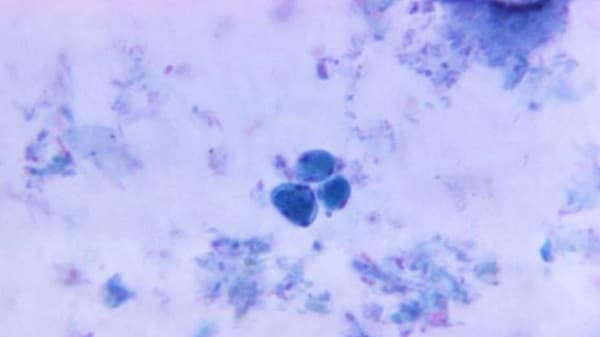Key points
- Blastocystis is a common, microscopic parasite that lives in a person's intestines.
- It can remain in your intestines for weeks, months, or years.
- If you are infected with Blastocystis, it is called blastocystosis.

Overview
Blastocystis is a microscopic parasite found throughout the world. A parasite is an organism (living thing) that lives on or inside another organism. A full understanding of Blastocystis and whether it causes disease in humans is unclear. There are prescription drugs available to treat blastocystosis in people with symptoms.
Signs and symptoms
Many people with blastocystosis have no symptoms. However, some people who have Blastocystis in their stool (poop) have some of the following symptoms:
- Watery or loose stools
- Diarrhea
- Abdominal pain
- Anal itching
- Weight loss
- Constipation
- Excess gas
In some studies, blastocystosis has also been associated with various skin rashes and hives.
How it spreads
It is unclear how Blastocystis spreads. However, the number of people infected appears to increase in areas that use unimproved sanitation facilities (when there is no sanitary separation of human waste from human contact). Studies have suggested that risk of infection may increase through:
- Consuming contaminated food or water.
- Working at or attending a daycare or childcare facility.
- Close contact with a wide range of animals.
There is little risk of spreading the infection if you practice good personal hygiene, as outlined in the prevention steps.
Prevention
You can take steps to prevent blastocystosis.
Sanitation and hygiene precautions
- Use sanitation facilities (toilets and latrines) that are out of reach from animals and will not let feces seep into the water or around food supplies.
- Wash your hands with soap and warm water after touching or working with soil or animals and before handling food.
- Teach children the importance of handwashing.
Food precautions
- Wash and peel fruits and vegetables before eating them.
- Avoid water or food that may be contaminated.
- When traveling in countries where the water supply may be unsafe,
- Avoid drinking unboiled tap water.
- Avoid uncooked foods washed with unboiled tap water.
- Avoid drinking unboiled tap water.
Bottled or canned carbonated beverages, seltzers, pasteurized fruit drinks, and steaming hot coffee and tea are safe to drink.
Diagnosis
If you think you have blastocystosis, speak with your healthcare provider. They may ask you to provide stool samples for testing. Diagnosis may be difficult, so your provider may ask you to submit several stool samples.
Treatment and recovery
Prescription drugs are available to treat blastocystosis. If you received a diagnosis of blastocystosis, speak with your healthcare provider about treatment options.
Read more: Clinical Care of Blastocystosis
